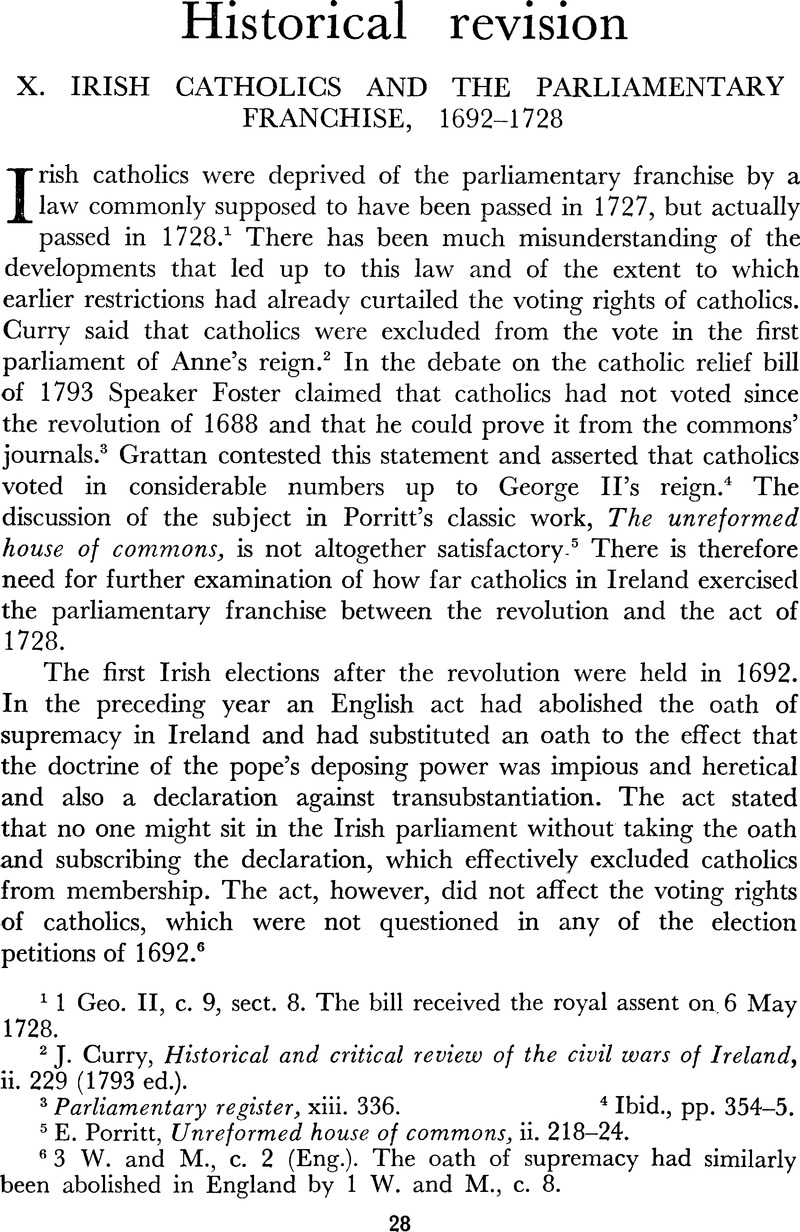Published online by Cambridge University Press: 28 July 2016

1 1 Geo. II, c. 9, sect. 8. The bill received the royal assent on 6 May 1728.
2 Gurry, J., Historical and critical review of the civil wars of Ireland, ii. 229 (1793 ed.).Google Scholar
3 Parliamentary register, xiii. 336.
4 Ibid., pp. 354–5.
5 Porritt, E., Unreformed house of commons, 2. 218–24.Google Scholar
6 3 W. and M., c. 2 (Eng.). The oath of supremacy had similarly been abolished in England by 1 W. and M., c. 8.
7 Commons’ jn. Ire. (ed. 1796), ii. 61.
8 Ibid., ii. 55; P.R.O., State papers, Ireland, 63/357, f. 201 (11 July 1695). The term ‘ oath of supremacy ’ was commonly applied to the oath about the pope’s deposing power which was substituted for it by 3 W. and M. c. 2 (Eng.).
9 Commons’ jn. Ire., ii. 57.
10 Ibid., ii. 148.
11 Ibid., ii. 166.
12 7 and 8 W. Ill, c. 27.
13 Commons’ jn. Ire., ii. 224.
14 Lords’ jn. Ire., i. 664–5.
15 King to Lord Clifford, 20 Nov 1697; King to Tenison, 30 Nov. 1697 (T.C.D., MS Ν 3. 1, pp. 134, 136).
16 Commons’ jn. Ire., ii. 230 (29 Nov 1697); Parliamentary register, xiii. 336.
17 Commons’ jn. Ire., ii. 253.
18 Ibid., ii. 320, 334.
19 Cal. S.P. dom., 1703–4, p. 185.
20 Commons’ jn. Ire., ii. 375–6; 2 Anne c. 6, sect. 24.
21 Curry, , Civil wars of Ireland, 2. 397 Google Scholar
22 N.L.I., Inchiquin papers. I am grateful to Mr John Ainsworth for showing me these references.
23 8 Anne, c. 3, sect. 22, 23; F. Annesley to Ormond, 29 Jan. 1704 (H.M.C., Ormonde MSS, new series, viii. 50).
24 Burke, W. P., Irish priests in penal times, p. 50.Google Scholar
25 Commons’ jn. Ire., iii. 80 (20 Feb. 1716).
26 Dublin Gazette, 29 July 1712 (Archiv. Hib., xvi. 17–18).
27 King to E. Southwell, 13 March 1711 (N.L.I., MS 2055).
28 Addison to Somers, 14 June 1709 (Letters, ed. W. Graham, p. 151) Addison was secretary to the lord lieutenant.
29 Commons’ jn. Ire., ii. 612–14; Addison to Sunderland, 20 June 1709 (op. cit., p. 155), Parl. register, xiii. 336. The petition, which was presented in October 1708, was not decided till June 1709—an unusually long time.
30 Commons’ jn. Ire., ii. 634.
31 Ibid., ii. 745, 753, 755.
32 2 Geo. I, c. 19, sect. 7.
33 Mountmorres, History … of the Irish parliament from 1634 to 1666, 1. 162 (1792).
34 Porritt, , Unreformed house of commons, p. 219 Google Scholar. Curiously enough, the words ‘oath of supremacy ’ occur in the margin of the 1786 edition of the Irish statutes. The words ‘oath of abjuration ’ are in the text in that edition and in the 1716 copy of the act.
35 Commons’ jn. Ire., iii. 534.
36 O’Conor, M., History of the Irish catholics, pp. 200–202 (1813)Google Scholar, Plowden, F., Historical review of the state of Ireland, 1. 263–9 (1803)Google Scholar; Commons’ jn. Ire., iii. 522.
37 See above, pp. 30, 33.
38 The Essex rules of 1672 imposed the oath of supremacy on officeholders in boroughs and on members of the common council, but not on freemen (Irish statutes, ii. 236). Porritt says that catholics were prevented from being freemen by 4 W. and M., c. 11. No such act exists. The reference seems to be to c. 2, which is not to the point and refers to the oaths required of protestant foreigners admitted to the freedom of boroughs (op. cit., ii. 224).
39 M. O’Conor, as above.
40 Burke, , Works, 3. 287, 307Google Scholar